
A complete biography of Achebe includes quotes from him as well as a brief synopsis of his novels. There is a list of all his works.
- Subject:
- Arts
- English Language Arts
- Material Type:
- Reading
- Provider:
- Author's Calendar
- Date Added:
- 08/28/2023

A complete biography of Achebe includes quotes from him as well as a brief synopsis of his novels. There is a list of all his works.
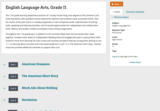
The 11th grade learning experience consists of 7 mostly month-long units aligned to the Common Core State Standards, with available course material for teachers and students easily accessible online. Over the course of the year there is a steady progression in text complexity levels, sophistication of writing tasks, speaking and listening activities, and increased opportunities for independent and collaborative work. Rubrics and student models accompany many writing assignments.Throughout the 11th grade year, in addition to the Common Read texts that the whole class reads together, students each select an Independent Reading book and engage with peers in group Book Talks. Students move from learning the class rituals and routines and genre features of argument writing in Unit 11.1 to learning about narrative and informational genres in Unit 11.2: The American Short Story. Teacher resources provide additional materials to support each unit.

In this 5-day unit, students will explore the topic of cheating. Cheating seems to be ever-present in today’s society. Whether we are talking about athletes being busted for using steroids or students “sharing” answers and plagiarizing on final exams, one thing is clear—there’s a whole lot of cheating going on. In this unit, students will take a look at some contemporary instances of cheating and argue whether under certain situations cheating is not only excusable, but also justifiable.

In this lesson, you will take the writing portion of the culminating assessment. You will continue to use the skills you have learned in the first three lessons of this unit.Today, students will take the writing portion of the culminating assessment.They will reflect on all the material they have read in this unit, and they will use their understanding of all the material presented to them to write an essay. You will evaluate their work in both reading comprehension and writing.
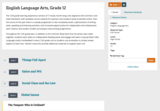
The 12th grade learning experience consists of 7 mostly month-long units aligned to the Common Core State Standards, with available course material for teachers and students easily accessible online. Over the course of the year there is a steady progression in text complexity levels, sophistication of writing tasks, speaking and listening activities, and increased opportunities for independent and collaborative work. Rubrics and student models accompany many writing assignments.Throughout the 12th grade year, in addition to the Common Read texts that the whole class reads together, students each select an Independent Reading book and engage with peers in group Book Talks. Language study is embedded in every 12th grade unit as students use annotation to closely review aspects of each text. Teacher resources provide additional materials to support each unit.

In our lives, we are constantly telling stories to ourselves and to others in an attempt to both understand our experiences and present our best selves to others. But how do we tell a story about ourselves that is both true and positive? How do we hold ourselves up in the best possible light, while still being honest about our struggles and our flaws? Students will explore ways of interpreting and portraying personal experiences. They'll read Chinua Achebe's novel Things Fall Apart , analyzing the text through the eyes of one character. They'll get to know that character's flaws and strengths, and they'll tell part of the story from that character's perspective, doing their best to tell an honest tale that presents their character's best side. Then they'll explore their own stories, crafting a personal narrative about an important moment of learning in his or her life.
ACCOMPLISHMENTS
Students read and analyze Chinua Achebe’s Things Fall Apart , viewing the events and conflicts of the novel through the eyes of one of the central characters.
Students write a two-part narrative project: one narrative told through their character’s perspective and one personal narrative about an incident in their own life.
GUIDING QUESTIONS
These questions are a guide to stimulate thinking, discussion, and writing on the themes and ideas in the unit. For complete and thoughtful answers and for meaningful discussions, students must use evidence based on careful reading of the texts.
How do our conflicts shape and show our character?
How can we tell a story about ourselves that’s both honest and positive?
How do definitions of justice change depending on the culture you live in?
What are ways individuals can react to a changing world? To a community that doesn’t accept us?
BENCHMARK ASSESSMENT: Cold Read
During this unit, on a day of your choosing, we recommend you administer a Cold Read to assess students’ reading comprehension. For this assessment, students read a text they have never seen before and then respond to multiple-choice and constructed-response questions. The assessment is not included in this course materials.

In this lesson, students will participate in a Benchmark Assessment (Cold Write). The Benchmark Assessment (Cold Write) is an unassisted and unrevised piece of writing whose purpose is to provide a quick gauge of the student’s mastery of the characteristics of a given genre. Today’s Benchmark Assessment (Cold Write) measures and provides a benchmark of students’ mastery of narrative writing. Then students will join a community of classmates who represent different characters from Things Fall Apart, and introduce their characters to this community.
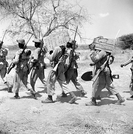
Who are the characters students will meet in this novel? In this lesson, students will become familiar with one particular character, through whose eyes they will read and interpret the novel. Students will make a profile of their character to introduce him or her to the rest of the class.
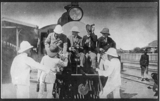
In this lesson, students will begin to learn how to use their digital course. How can this technology help them as a learner this year? How can they take advantage of the possibilities it offers?
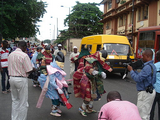
As students have seen to this point, different characters react differently to the coming of the Christian missionaries. In this lesson, students will participate in a discussion in character: their characters will debate whether Christianity has been a good thing for the Igbo people.
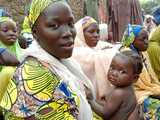
There are different ways of gaining authority or control as an outsider. In this lesson, students will begin to examine how Mr. Brown, one of the missionaries, won converts to his religion and way of life despite being outnumbered.
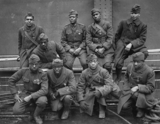
What defines a community? In this lesson, students will begin to analyze the Umuofuan community, where Okonkwo lives. Students will think about how their character perceives this community, and consider how they perceive the community they belong to.

Can a person be both admirable and flawed at the same time? In this lesson, students will look more closely at the character of Okonkwo. Students will figure out what his most admirable qualities are, as well as some of his flaws. They will also decide whether Okonkwo has the potential to be a tragic hero.
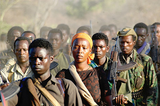
Does being part of a community mean that you accept the values and customs of that community? In this lesson, students will begin to analyze what they know about Umuofian society, and try to figure out how various characters feel about its customs.

In this lesson, students will debate the fairness of Umuofian society and whether anything needs changing. They will remain in character, ensuring that all sides of the issue are fully explored and defended.
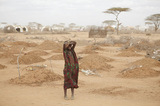
What roles do men and women play in Umuofian society? How are expectations of husbands and wives, sons and daughters, brothers and sisters, different from each other? In this lesson, students will examine gender roles and expectations in Umuofian society.Read the lesson and student content.Anticipate student difficulties and identify the differentiation options you will choose for working with your students.
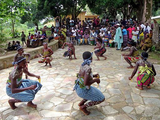
In this lesson, students will create found poems—poems using language from the novel itself—to explore the impact that colonialism has on people’s self-esteem, and on the Igbo people in particular.

Facts are facts, but often there is more than one way to tell a “true” story. In this lesson, students will examine the story of the missionaries’ arrival, viewing it from different characters’ perspectives and thinking about the different true versions that can be told about one set of events.